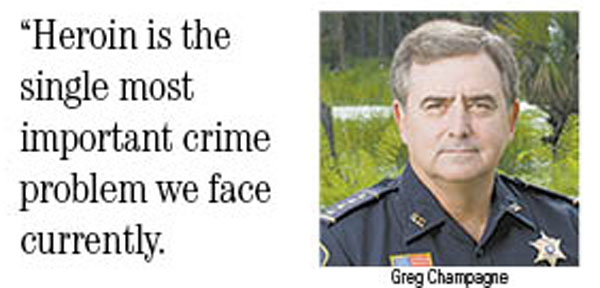
Mandatory 10-year sentence for heroin dealers
A proposed law that would introduce a mandatory two-year prison sentence for heroin possession and a minimum mandatory sentence of 10 years for heroin dealers is poised to pass the state legislature and become law later this year.
The bill, HB 332, is aimed at decreasing what public officials are calling a heroin epidemic. In fact, the legislation is supported by the Louisiana Sheriff’s Association, the Louisiana District Attorney’s Association and the Louisiana State Police.
In addition to providing minimum mandatory sentences for both heroin possession and dealing, the bill would increase the maximum sentence for heroin dealers to 99 years in prison. An amendment was added to the bill before it passed the House in a 94-1 vote that would also mandate drug treatment for those incarcerated for heroin.
St. Charles Parish Sheriff Greg Champagne said he is in full support of the bill.
“Heroin is the most dangerous illegal narcotic available today. The number of deaths from the use of heroin has skyrocketed nationwide in the last few years,” he said.
In fact, over the past three years there has been a rise in the number of heroin overdose deaths in St. Charles Parish. According to the St. Charles Parish Coroner’s Office, in 2011 there were seven overdose deaths, one of which was due to heroin. However, in 2013 the number of heroin overdose deaths jumped to four.
Champagne said the rise in heroin use and sales is largely due to a crackdown on the abuse of prescription pain pills, which, similar to heroin, are opiates.
“It has become more difficult to ‘doctor shop’ and obtain an excessive amount of other narcotics via prescriptions,” he said. “It is easier for law enforcement to track and enforce prescription abuse. Hence, abusers have turned to heroin as a cheap and readily available alternative.”
With prescription pills becoming unobtainable, Champagne said drug cartels have been focusing on smuggling more and more heroin into the country as opiate addicts have turned to the drug.
Champagne said stricter sentencing requirements would help combat the rise of heroin use.
“Heroin is the single most important crime problem we face currently. The heroin epidemic nationwide is like a wildfire spreading quickly. Unless we get a fire hose and douse it quickly and strongly, the result will be more families finding their loved ones dead with a needle stuck in their arm,” he said.
As a former assistant district attorney in St. Charles Parish from 1982 to 1996, Champagne said mandatory minimum sentences that were in effect at that time reduced the prevalence of heroin.
“During these years, the penalty for distribution of heroin was life in prison. I can tell you that I do not remember one single case of heroin distribution that I handled. The drug dealers of the day would not touch it. It was no doubt a deterrent,” he said.
However, Marjorie Esman, director of the Louisiana chapter of the American Civil Liberties Union, said that there is no hard evidence that such mandatory sentencing actually worked in the past or will work in future.
“There is no real evidence from anywhere in the country that harsher sentences really fight drug use. The fact is that 50 years of the war on drugs has done nothing to diminish drug use,” she said. “If you look at real studies, there are none that say mandatory sentences will cut down on drug use.”
Esman said that before sweeping changes such as mandatory sentences for heroin users are employed, elected leaders first need to identify why people are using heroin and deal with addicts medically rather than through incarceration.
“I would really welcome a serious discussion about this as a public health problem. I think a lot of people don’t see it that way, but it really is,” she said. “If you are locked up for just using drugs, you don’t need to be locked up.”
In fact, evidence was released last year showing that drug use was prevalent in Orleans Parish Prison.
Esman said in addition to drugs being smuggled into some correctional facilities, not all facilities offer the proper treatment for heroin addicts.
“Prison is not necessarily the best place to send somebody that has a problem,” she said.
In addition to not treating the problem properly, Esman said putting drug users in jail would be very costly to taxpayers.
“It is between $17,000 a year and up. When these people get older, as they will, the costs go up for medical care,” she said.
Esman estimates the cost of a two-year sentence for the average heroin user would cost taxpayers at least $35,000.
“That is a lot of money that could go very far if spent for addiction services for people who need it and reduce the demand. If you reduce the demand, you will inevitably reduce the supply,” she said.
Despite the definite increase in prison population such a law would create, Champagne said the effort would be worthwhile.
“Mandatory minimums will increase the prison population in the short term, but I truly believe in the long term it will save lives and reduce crime,” he said.




Be the first to comment